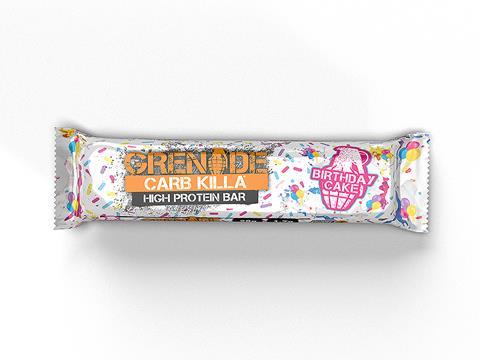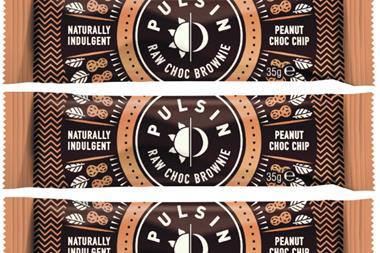Sports nutrition is pumped up. The category has power-lifted its way to gain over 20% extra value this year, making it the fastest-growing category in this report by percentage.
For this is the year brands have made a much more concerted play for the mainstream market. The move away from gym buffs has been slowly gaining ground for years. This time, though, efforts have ramped up another notch as sports nutrition looks to compete with mainstream confectionery.
Data Box
Top 15 Sports Nutrition
So much so, in fact, that the lines between the two categories are blurring. For proof, look no further than the stellar performance of the Mars and Snickers sports nutrition lines, up 61.7% and 42% in value respectively. There are sure to be more successes where that came from. Mondelez, for one, jumped on the bandwagon in July with a new Boost + Protein bar, containing 12g of protein and 32% less sugar than a standard boost bar.
Still, it’s the brands with their roots in sports nutrition that are booming. New number one brand Grenade is a prime example. Its stellar growth made it an acquisition target for private equity giant Lion Capital in a £72m deal last March. Over the past year, its sales have more than doubled to over £16.4m.
One look at the almost confectionery-like packaging of its Birthday Cake Carb Killa bars (see Top Launch, below) tells you why. For these bars are reaching beyond sports nutrition into the lucrative world of snacking. “In as little as a year we’ve seen the needs of the shopper change substantially,” says Juliet Barratt, co-founder and chief marketing officer at protein bar company Grenade. “The key reason to purchase protein bars now is as a snack between meals, usually as an alternative to chocolate.” As a result, Grenade has seen a 46% surge in sales of Carb Killa bars.
Another brand to win big from this trend is Irish startup Fulfil, founded two years ago. Over the past 12 months, sales of its vitamin and protein bars have leapt 341.7% to £6.7m. “Progressive retailers are looking at the total snack bar market and realising that the biggest segment - traditional chocolate countlines - has been in decline for many years,” says CEO Brian O’Sullivan. “Virtually all the growth in snack bars is being driven by Fulfil and other protein bars. Retailers are giving more space to these brands at the front of store, giving their shoppers the choice between traditional high-sugar confectionery bars and low-sugar alternatives.”
Adam Curtis, associate director of MMR Research Worldwide, says brands such as Grenade and Fulfil have grown by “configuring themselves to be accessible, attractive and available in impulse areas of the store”.
The on-the-go positioning of these bars is key to their success, adds Mark Neville, managing director of protein smoothies and drinks supplier Upbeat Drinks. “Consumers demand great taste, competitive pricing and ultimate convenience in their shopping,” he says. “We ensure products are ranged in front of store fixtures and close to grab-and-go fixtures. We’ve also expanded our range to cater for on-the-go consumers, launching Upbeat real fruit spring water to provide a lighter nutritional drink.”
Taking valuable till space at the major mults is one thing. But even less obvious retailers are getting on board. M&S began stocking Grenade in August and, ahead of Christmas, took an exclusive listing of its Carb Killa Gingerbread bar. Although the M&S customer base may not seem like an obvious one for sports nutrition, Grenade says the brand is performing well among 45 to 54-year-old shoppers.
This demographic shift speaks volumes about the state of the category. It’s a trend that is accelerating, says online healthy food retailer Musclefood. “The demographic of the customer seems to have changed from your traditional body builders now to those focusing on leisure, lifestyle and fitness,” says director Nick Preston. “There’s a significant drive towards consumers understanding more about ingredients and the benefits of protein.”
Holland & Barrett has also seen appeal broaden. “Younger and male customers are the most keen exercisers, but we’re seeing a growing awareness among female customers of how sports nutrition can support health, fitness and nutrition goals,” says senior category manager Jessica Keeble.
In the midst of all this innovation to cater for the mainstream audience, more traditional sports nutrition brands are falling behind. See Maxinutrition, which has lost its leading position amid a £2.9m fall in sales. That’s over a fifth of its value.
Curtis of MMR Research says this is all down to a change in consumer perceptions. “The hard core of sports nutrition is considered too serious and scientific,” he says. As a result, Preston of Musclefood says “traditional powder brands” are struggling. “They tend to be like large oil tankers with small rudders, because their business has been built around powders historically. They’ve found it difficult to progress and capture this new market, which is moving towards lifestyle and fitness. This lends itself to the emergence of disruptor brands such as Grenade.”
“The hard core of sports nutrition is considered too serious and scientific”
Don’t write off the established brands just yet, though. Maxinutrition was acquired from GSK by the Healthy Nutrition Company in April and it’s now feeling pretty optimistic about the future. “2019 will be an exciting and pivotal year for Maxinutrition,” says sales director Dan Wood. “There has been a period of significant review and development, resulting in a new strategy that will see improved graphics and exciting NPD, supported by updated marketing plans.” Seeking to reap the rewards in the protein bar market, Maxinutrition has already launched two new flavours - banoffee and rocky road - under its Maximuscle brand, which will be initially available in Asda before being rolled out more widely over the coming months.
Indulgent flavours such as these are key to future success in the category, says Matt Hunt, founder of The Protein Ball Co. “These flavours will appeal to the 44% who struggle to find sports nutrition products that taste nice,” says Hunt, referring to a 2018 Mintel report on attitudes to sports nutrition. “Many of these indulgent ranges also have low or reduced sugar content to help position themselves as healthy alternatives to chocolates and cakes. As there is still limited availability of low or reduced sugar options in sweet treats, this could appeal to the everyday consumer looking to reduce their sugar intake.”
Grenade’s Barratt also believes there is further mileage in the growing healthy snacking market. “The challenge for retailers will be to consider how to maximise the opportunity elsewhere in store, particularly in impulse-driven categories such as confectionery and soft drinks,” she says.
As retailers take note of the rapid rise in sports nutrition sales, they will be sure to take up this challenge. But who will win in this next phase is anyone’s guess. As traditional powder brands look to take on challengers, another shake-up of the category could well be imminent.
TOP LAUNCH

Grenade Birthday Cake bar, Grenade
Grenade might have started out as a gym buff brand, but it has rapidly gained wider appeal – and this bar is a prime example of why. Designed to tempt consumers looking for taste plus a protein hit, the brand says the Birthday Cake variant has sold across a range of demographics since launching in August. Despite the nougat-filled bar being smothered in white chocolate and sprinkles, it contains only 218 calories and less than 2g of sugar. So consumers can have their cake and eat it too.



















No comments yet